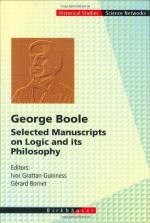|
This section contains 1,674 words (approx. 6 pages at 300 words per page) |

|
George Boole, an English mathematician and logician, is regarded by many logicians as the founder of mathematical logic. He could be called the Galileo of logic in that he definitively established the mathematical nature of logic—assuming that it was Galileo Galilei who did this for physics, rather than, say, Archimedes. He is considered to be among the five greatest logicians, the others being the Greek philosopher Aristotle, the German mathematician Gottlob Frege, the Austrian mathematician Kurt Gödel, and the Polish mathematician Alfred Tarski.
Like Aristotle, he never had the opportunity to take a course in logic. His parents' economic circumstances precluded the usual formal education. He never took a college course and, thus, never received a bachelor's degree. Nevertheless, he taught many college courses as a professor of mathematics and he received honorary doctoral degrees from such distinguished institutions as Trinity College...
|
This section contains 1,674 words (approx. 6 pages at 300 words per page) |

|


